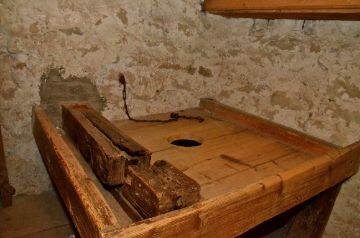Tryni Bieri
Katharina "Trini" Bieri is about 40 years old when Men who hunted Anabaptists track her down in the spring of 1710 and bring her to Trachselwald Castle. They had already caught her husband Caspar earlier, led him to Bern and exiled him to America together with about 50 Bernese Anabaptists.

Picture: The "Mörderchäschtli" at Trachselwald Castle.
Imprisoned together with Trini in Trachselwald are her three sons Daniel (8), Caspar (6) and Hans (4). Since the three boys have not yet been baptized, the Bernese authorities have now ordered their forced baptism. It is assumed that they, like the older daughters Barbara (15) and Cathrin (12), are to be placed with relatives and acquaintances. After a longer imprisonment in Bern, Trini Bieri is forced to leave in the summer of 1711 together with almost 400 other Bernese Anabaptists. Because of her weakness, she was allowed to leave the emigrant ship in Mannheim and presumably tried to make her way to Alsace. Whether she ever saw her husband and children again, we do not know.
More information:
Katharina «Tryni» Bieri from Hopferen near Heimisbach / Trachselwald (ca. 1667-?)
It is April 1710 and Katharina "Tryni" Bieri is imprisoned in Trachselwald Castle.[1] With her in the semi-dark, cramped and dank cell are her three sons Daniel (8), Caspar (6) and Hans (4). She has not seen her husband Caspar, to whom she has been married for 16 years [2], for a very long time. He had also been arrested, even before her. They had both been warned. If they did not give up their Anabaptist convictions, they would be imprisoned, expelled from the country - or worse. Then, a year ago, her husband had been deported - forever.[3] And a return was punishable by death.
But the love for his family was probably stronger. Shortly thereafter, Caspar Bieri found himself in prison again. In March 1710 he belonged to the group of over 50 Bernese Anabaptists who were to be deported down the Aare and the Rhine via Rotterdam to America, chained to irons.[4]
The pain had almost torn Tryni apart. She, too, had been captured. Men who hunted Anabaptists had tracked her down. But unlike her "previously convicted" husband, she was not taken to the capital, but to the keep at Trachselwald Castle. Her 15-year-old daughter Barbara[5] and 12-year-old daughter Cathrin[6] had been taken away from her and placed with acquaintances. Only the three boys had been left to her. Unlike her older sisters, they had not yet been baptized. When the parents Trini and Caspar had accepted the Anabaptist faith about 10 years ago, she and her husband decided not to baptize any child that would be given to them. Faith and church membership - they were convinced - could not be forced via infant baptism, but had to remain voluntary.
The Bernese authorities did not tolerate this. They ordered that the three boys be baptized immediately: Daniel in Eriswil, his father's hometown. Caspar in Lauperswil, where one of his father's brothers farmed the Kappelmatt with his family. And Hans in Tryni's own parish of Trachselwald at the foot of the Schlossberg in the church whose bells she could hear high up in her cell. As a mother, she knew what these baptisms[7], performed on April 6, 1710, meant: The three boys would be torn apart and placed with relatives who lived in these three villages.
This did not bode well for her either. She would probably never be allowed back to her children. And indeed: she never saw her children again. Shortly thereafter, she was taken by military police to the Insel prison in Bern.[8] During the winter months she heard rumors that the Dutch Mennonites wanted to obtain a free departure for all the Bernese Anabaptists who had been harassed in their homeland. And indeed: in February she was provisionally released from prison to settle her affairs at home and get ready to leave.[9] For the last time, she could see her own children. Once again, the pain threatened to tear her heart apart. Was she not paying too high a price for her convictions? A small hope filled her. She had been told that her husband had not been deported to Pennsylvania, but that the Dutch authorities had released all the prisoners when the prisoner boat crossed the border. And someone reported that Caspar Bieri had found shelter with brothers and sisters in Markirch (Sainte-Marie-aux-Mines) and was now trying to have his family join him.[10]
It was to this straw that Tryni Bieri clung when, in July 1711, she and nearly 400 Bernese Anabaptists boarded one of the ships that would take them to the Netherlands to join their benefactors.
The only thing we know of Tryni Bieri's subsequent fate is this: Because of her weakness, she was apparently granted permission to leave the ship in Mannheim.[11] She probably tried to get to Alsace to look for her husband there. Whether she succeeded in doing so, whether the possibly reunited parents were able to bring their children, who had been placed in Emmental, to live with them - we do not know. In the midst of much suffering and pain that the Bernese Anabaptist policy inflicted on some of its own subjects, there were indeed smaller and larger miracles time and again. Was this also true for Tryni Bieri and her family?
[1] KB Trachselwald 9, 106.
[2] KB Rüderswil 5, 583.
[3] StABE A II 621, 372f. und B IX 486, 173.
[4] StABE B IX 486, 215ff. and GA Röthenbach, Schenk-Chronik vol. VI, 75ff.
[5] KB Eriswil 3, 86.
[6] KB Trachselwald 3, 105.
[7] KB Trachselwald 9, 106, KB Eriswil 3, 110, KB Lauperswil 5, 397f. (The data differ from each other).
[8] Statsarchief Amsterdam (SAA) 565, A 1269 and 1393f.
[9] SAA 565, A 1395.
[10] ADHR E 2089.
[11] SAA 565, A 1396a.



